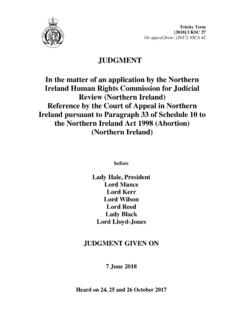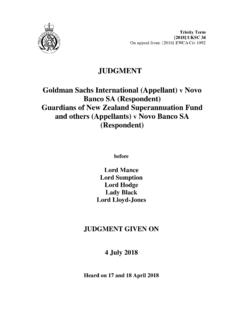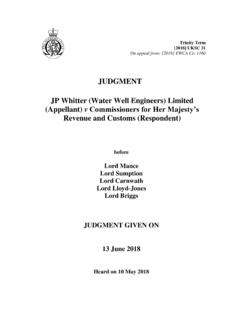Transcription of Separation of Powers - Supreme Court of the United …
1 Separation of Powers Please ask your students to answer questions on a separate piece of paper. The questions are marked from 1-4 as a guide to how much content the student should provide. Total is out of 34. The answers here are suggestions and are by no means exhaustive. What is the Separation of Powers ? The doctrine of the Separation of Powers requires that the principal institutions of state . executive, legislature and judiciary should be clearly divided in order to safeguard citizens'. liberties and guard against tyranny. One of the earliest and clearest statements of the Separation of Powers was given by French social commentator and political thinker Montesquieu in 1748: When the legislative and executive Powers are United in the same person, or in the same body of magistrates, there can be no there is no liberty if the Powers of judging is not separated from the legislative and there would be an end to everything, if the same man or the same were to exercise those three Powers .
2 '. According to a strict interpretation of the Separation of Powers , none of the three branches may exercise the power of the other, nor should any person be a member of 1. any two of the branches. By creating separate institutions it is possible to have a system of checks and balances between them. But the United kingdom does not have a classic Separation of Powers that, for example, applies in the United States. 1) What are the three principal branches of state in the UK? (1 mark). Executive, Legislature and Judiciary. 2) For each of the three branches, name the main organisations or bodies considered part of that branch. (3 marks). In the UK, the executive comprises the Crown and the Government, including the Prime Minister and Cabinet ministers.
3 The legislature; Parliament, comprises the Crown, the House of Commons and the House of Lords. The judiciary comprises the judges in the courts of law, those who hold judicial office in tribunals and the lay magistrates who staff the magistrates' courts. 3) What is the main role of each of the branches? (3 marks). The Legislature makes laws. The Executive puts those laws into effect and plans policy. The Judiciary administers justice by interpreting the law when its meaning is in dispute, ensuring the law is upheld. 1. Benwell, Richard and Gay, Oonagh The Separation of Powers ' House of Commons Library. 4) Draw a diagram to illustrate the Powers of state. (1 mark). 5) Why do you think Montesquieu was so concerned about the same person or body exercising more than one of those three Powers ?
4 (1 mark). Too much power could lead to bias, corruption or conflicts of interest, or at the very least the perception of such. What about devolution and the Separation of Powers ? Devolution is the statutory granting of Powers from the central government of a sovereign state to government at a sub-national level, such as a regional, local, or state level. It is a form of decentralization. Devolved territories have the power to make legislation relevant to the area. From 1998, certain Powers have been devolved to Scotland, Wales and Northern Ireland from the Houses of Parliament, creating the Scottish Parliament, National Assembly for Wales and Northern Ireland Assembly. They now have executive and legislative Powers over certain laws within their countries such as health care, education and prison services.
5 Beyond the UK. The UK has a partially unwritten and uncodified constitution which allows for more fluidity in the arrangements of its Powers of states. Similarly, to the UK, Sweden and the Netherlands are constitutional monarchies: they evolved continuously over at least two centuries, gradually subjecting the exercise of Powers held by the head of state and government to legal and constitutional constraints. On the other hand, some countries have a very explicit distinction between their institutions of state, for example the United States' written and codified Constitution adheres closely to the doctrine of Separation of Powers . Article I grant Powers to the legislature; article II gives executive power to the President; and article III creates an independent judiciary.
6 Congress is elected separately from the President, who does not sit in the legislature. The US. 2. Supreme Court can declare the acts of both Congress and President to be unconstitutional. Germany on the other hand has five political bodies which share the three Powers of the legislative, executive and judiciary. Bundesregierung / The Federal Cabinet Bundestag / The Federal Parliament Bundesrat / The Federal Council Bundespr sident / The Federal President Bundesverfassungsgericht / The Federal Constitutional Court 2. Benwell, Richard and Gay, Oonagh The Separation of Powers ' House of Commons Library 3. The Separation of Powers and the Judiciary Back to the UK: Before the 2005 Constitutional Reform Act For background, you can read about the reasons the Government of the day introduced the 4.
7 Constitutional Reform Bill here, in the official explanatory notes' to the Bill: 6) Which two branches of state was the 2005 Constitutional Reform Act trying to separate more distinctly? (1 mark). The judiciary from the legislature. 4. Bills become Acts once they are passed by Parliament and given Royal Assent which means the Sovereign has approved the legislation and it can be brought into force. After the 2005 Constitutional Reform Act 7) What is the Lord Chancellor and how did this role change after the 2005. Constitutional Reform Act? (3 marks). The Lord Chancellor is usually a member of the Cabinet and has a responsibility for upholding the rule of law and protecting judicial independence. The Constitutional Reform Act 2005 removed the judicial functions of the Lord Chancellor, and his former role as head of the judiciary is now filled by the Lord Chief Justice (head of the judiciary in England and Wales).
8 The role of Lord Chancellor is now combined with that of the Secretary of State for Justice. In addition, the Lord Chancellor no longer sits as Speaker of the House of Lords, which now elects its own Speaker. This was all intended to create a more formal Separation of Powers . 8) How did the system of judicial appointments change after the Constitutional Reform Act? (4 marks). Before the Constitutional Reform Act 2005, judicial appointments were made on the recommendation of the Lord Chancellor, who was a Government Minister. The legislation established an independent Judicial Appointments Commission /Boards for England and Wales, for Northern Ireland and for Scotland. In England and Wales judges are represented on the Commissions, but do not hold a majority, and the Commissions have to have a lay Chair.
9 The Commissions recommends candidates to the Lord Chancellor, who has a very limited power of veto. The Act gives the Commissions a specific statutory duty to encourage diversity in the range of persons available for selection for appointments . In England and Wales, the Commission recommends candidates to the Lord Chancellor, but that is not the case in either Scotland or Northern Ireland. In Scotland it is a Judicial Appointments Board and not a Commission. In Northern Ireland the Commission does not have a lay chair but the Lord Chief Justice chairs. Separate procedures apply to the appointment of Supreme Court judges, which take account of the fact that the Court has a UK-wide remit. When a new UKSC Justice needs to be appointed, an ad hoc selection commission is set up and presided over by the President of the UKSC.
10 The Lord Chancellor has limited rights to reject or invite a reconsideration, but once he is content the recommendation passes to the Prime Minister, who then passes the recommendation to The Queen. 9) What replaced the appellate committee of the House of Lords as the highest Court of appeal in the UK and why? (2 marks). The Supreme Court of the United kingdom (UKSC). During the passage of the legislation, Lord Falconer, the Lord Chancellor at the time of the legislation that established the UKSC, told the House that the time has come for the UK's highest Court to move out from under the shadow of the legislature [..] the key objective is to achieve a full and transparent Separation between the judiciary and the legislature [ ] the Supreme Court will be administered as a distinct constitutional entity.










